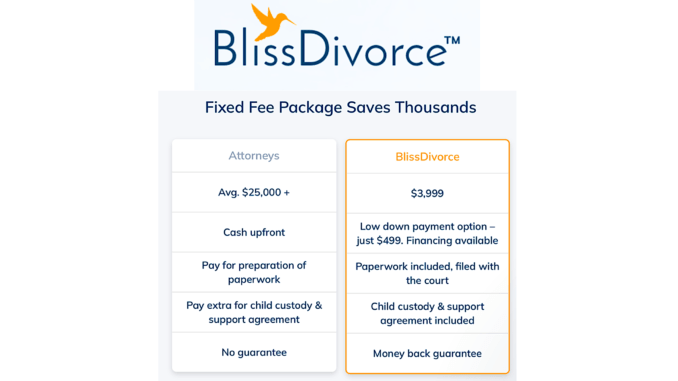
Divorce is painful. Legally dividing assets and agreeing on child custody, with all its complications and costs, can be a nightmare. If there was ever a legal area where things could be improved by better processes and some useful tech this has to be one of them, thankfully there are lawyers out there to help you out.
There are a few companies working in this field, but one that Artificial Lawyer spoke to this week is BlissDivorce, run by Las Vegas-based Scott Seidewitz.
Seidewitz started off by noting that Vegas is ‘the marriage and divorce capital of America’. He also explained that while he is not divorced, his co-founder is, and his parents also split. However, he added that it was while working for consumer legal site, LegalZoom, as a marketing strategy consultant that he saw just how messed up the field of divorce is, with legal costs largely driven up by complex forms and bureaucracy, and lawyers who felt they had to fight for every penny, leading to higher fees and endless disputes.
In short: there had to be a better way!
The short video below (5 mins) shows some of the key aspects of how BlissDivorce works. But the main gist of it is that they have moved all of the aspects of a divorce online, with a clear digital process that takes you step by step through each area of asset division, property division as well as child custody.
I follow this site daily for its insights,
This is a very insightful article even by the site’s high standards and an equally thought provoking commentary.
You will remember I hope from the help you have previously given to me that my interest is in legal costs. The article and the commentary assume that a party has only to try somehow to find the costs of their own lawyer. This is because in the US the rule or practice is that, with presently irrelevant qualifications, each party to proceedings has only these costs of their own lawyer to consider . The problems multiply when, as in England and Wales and here in Australia, those costs may be recoverable by a winner in the proceedings from the loser in the proceedings .
Like ADR, legaltech is potentially a solution here, too.
To your knowledge are there any vendors claiming success here?
RQ
Hi Roger – Replying to your question about vendors claiming success. Wasn’t sure if you were referring to England/Wales/Australia specifically.
In California, the BlissDivorce online platform has succeeded in helping couples reach agreement without attorneys or mediators in 60% of cases (the remainder required 1-6 hours of mediation to reach agreement). These were not simple, amicable divorces–average asset size was just under $1 million and many had significant disagreements before starting the process.
We consider this a strong success and will continue to reduce the % of cases that require mediation as we introduce new dispute resolution technology.
Scott Seidewitz, CEO, BlissDivorce